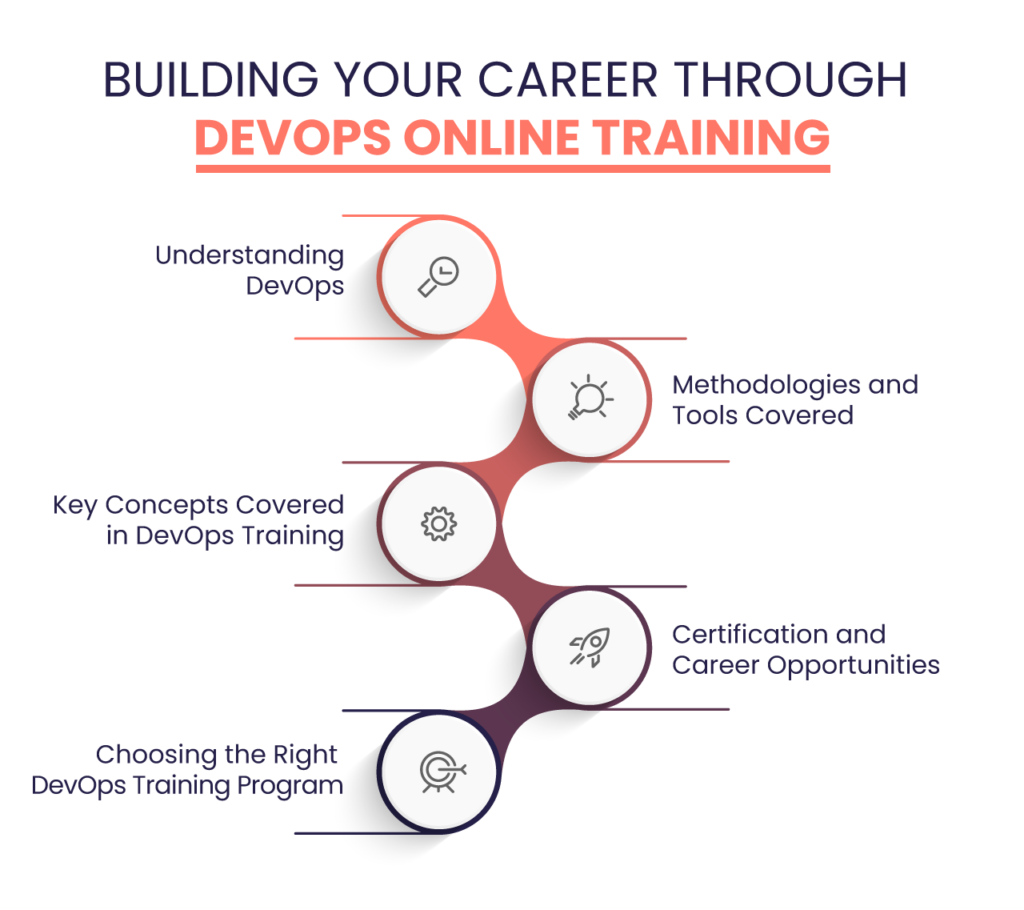Introduction
In the IT field, DevOps is a methodology that combines software development (Dev) and IT operations (Ops) to increase collaboration and productivity, which is in high demand. By providing you with the necessary knowledge and abilities, receiving online DevOps training will significantly improve your employment prospects. Below is a complete overview that outlines the advantages, approaches, and potential outcomes of online DevOps training:
Guidelines for your DevOps online training
Following the guidelines below for your DevOps online training can help you work in the right direction
1) Understanding DevOps
- The initiative known as DevOps is a cultural and organizational change that prioritizes continuous improvement, automation, and teamwork between development and operations teams.
- Its purpose is to increase application quality and dependability, speed up release cycles, and optimize the software delivery pipeline.
2) Understanding DevOps
- Enhanced Employability: DevOps experts are in great demand as businesses look to enhance their software development workflows.
- Competitive Advantage: Specializing in DevOps gives you a competitive advantage in the modern software development industry by providing you with the skills you need
- Career Advancement: DevOps roles often offer attractive salaries and opportunities for career development and advancement.
- Increased Efficiency: Organizations can deploy software more quickly and reliably with the help of DevOps principles, thereby increasing productivity and customer satisfaction.
3) Key Concepts Covered in DevOps Training
- Automation: Automation tools and methods for developing, testing, and deploying software are covered in DevOps training.
- Continuous Integration (CI) and Continuous Deployment (CD): All the processes of integrating code changes, executing tests, and deploying apps are automated using CI/CD pipelines.
- Infrastructure as Code (IaC): Infrastructure as a Service (IaC) concepts enable automated infrastructure provisioning and configuration by teaching you to manage infrastructure using code.
- Monitoring and logging: To guarantee the functionality and health of apps and infrastructure, DevOps training includes monitoring and recording best practices.
- Collaboration and Communication: DevOps emphasizes efficient feedback loops and communication between development and operations teams.

4) Choosing the Right DevOps Training Program
- Accreditation and Reputation: Look for DevOps training courses provided by reputable establishments or groups that have a history of providing top-level education.
- Curriculum: Make sure the training course covers fundamental DevOps principles, techniques, and technologies that are relevant to your professional objectives.
- Hands-on Experience: To reinforce theoretical principles, look for training programs that offer practical labs, projects, or real-world settings.
- Flexibility and Convenience: To meet your schedule and obligations, utilize the self-paced learning options and flexible schedules offered by online training programs.
- Instructor Expertise: Check the credentials and background of the training instructors to ensure that they have the requisite knowledge of DevOps techniques and tools.
5) Methodologies and Tools Covered
- Agile Methodology: Agile processes and concepts, such as cross-functional teams, rapid feedback loops, and iterative development, are often included in DevOps training.
- Version Control Systems: Version control systems like Git are commonly included in training programs because they are important for controlling code changes and promoting collaboration.
- Configuration management tools: Popular configuration management systems to automate infrastructure provisioning and administration, such as Ansible, Puppet, or Chef, are covered in DevOps training.
- Containerization Technologies: DevOps training typically covers Docker and Kubernetes for application deployment, orchestration, and containerization.
- Continuous Integration and Deployment Tools: To effectively automate CI/CD pipelines and deploy software changes, training programs may include Travis CI, CircleCI, or Jenkins.
6) Practical Applications and Projects
- DevOps training online often includes practical activities, projects, or case studies that allow you to use the knowledge and resources gained in real-life situations.
- These practical experiences help strengthen theoretical understanding, enhance problem-solving abilities, and increase self-assurance when using DevOps processes and tools.
7) Certification and Career Opportunities
- As a DevOps expert, you can become more credible and marketable by completing DevOps training and obtaining the necessary certifications.
- Many career options in DevOps occupations can be made possible by certification programs such as AWS Certified DevOps Engineer, Docker Certified Associate, or Certified Kubernetes Administrator.
- DevOps specialists with job titles such as DevOps Engineer, Site Reliability Engineer (SRE), or DevOps Architect are in high demand across a variety of industries, including technology, banking, healthcare, and e-commerce.
Conclusion
Enrolling in online DevOps training provides an opportunity to establish a rewarding career in the rapidly evolving and fast-paced technology industry. Gaining proficiency in DevOps ideas, techniques, and technologies can lead to exciting opportunities for personal growth, professional success, and career fulfillment. Choose a reliable DevOps course online, emphasize practical learning, and use certifications to highlight your qualifications and abilities to potential employers.
I hope you will read the blog carefully and get some information about building your career through DevOps online training. If you still have any questions, you can contact us










